#references to the old testament
Quote
Understand, then, that those who have faith are children of Abraham. Scripture foresaw that God would justify the Gentiles by faith, and announced the gospel in advance to Abraham: 'All nations will be blessed through you.' So those who rely on faith are blessed along with Abraham, the man of faith.
Galatians 3:7-9 NIV (2011)
#bible verse#scripture#scriptures#christianity#faith#abraham son of terrah#prophecy#nations#gentiles#blessings#trusting God#galatians 3#new international version#references to the old testament#genesis 12#books#nations: ethne#gentiles: ethne
21 notes
·
View notes
Text
PSA: The Torah is NOT the equivalent of the Old Testament. That is the Tanakh. The Torah only covers the first five books (Genesis, Exodus, Leviticus, Numbers, Deuteronomy).
I've seen too many people be highly confident in this idea and it's driving me a bit mad. Oh and also the Jewish understanding of these texts is worlds away from the Christian understanding, so just keep that in mind. Anyway, that's all.
Ignore the tags, B"H.
#judaism#torah#tanakh#psa#old testament#christianity#bible#jewish#jumblr#religion#carverop#yeshivawithcarver#references
932 notes
·
View notes
Text
One of the most interesting things about religion to me is that so many people don’t even see the mental gymnastics they are doing to try and shape the biblical texts into a framework that is acceptable in the modern day and it comes out looking like something that none of the authors would have approved of.
#not to mention that they were written by authors at different times and for different purposes#so they say lots of different things#which makes it easy to pick and choose the interpretation that best matches what you want#like the ‘one man one woman’ definition of marriage that doesn’t exist literally anywhere in the Bible#women were property and men could have as many as they wanted#but then once the Greeks influenced them a bit in the New Testament it says leaders of the church should have one wife#so that means the Bible is against polygamy even though every man in the Bible had multiple wives#or the people that say the Bible is against slavery#even though there is literal chattel slavery described in the Old Testament with commands on how to do it#and in the new testament slaves are told to obey their masters#then they say that they aren’t slaves just servants#which is completely false#it reminds me of how so many Protestants are vehemently against alcohol#so whenever the Bible refers to wine in a good context they say it’s juice#and whenever it’s bad it is wine#even though several different words are used that basically all refer to fermented alcoholic wine#they translate them all differently as needed#like how Jesus said sell all your belongings and give them to the poor#then the Bible tells how literally all of the early Christians sold all their possessions and donated the money#and now people say that just means to be generous#and then don’t even leave a tip at a restaurant because they hate handouts
9 notes
·
View notes
Text

the submas to sinnoh facility head pipeline. Help
#the single thorton fan out here#me#im going to make u all look.#this was for personal reference. anyways#pokemon#warden ingo#subway boss ingo#subway boss emmet#elite four caitlin#rival barry#factory head thorton#ingo#emmet#caitlin#barry#thorton#art#the knight's testaments#the ages are so funny to me i really made thorton 30 years old#caitlin is 14 in dppt and this kid reads as 16 to me#it checks out.#this is by bw2. so funny to me to make submas 27 purely because its a funny age#also did you know cyrus is 27? just thought that was neat
119 notes
·
View notes
Text
In a perfect world there would be more bloody art of new testament and more slutty art of old testament. In a perfect world there would be balance. I hope you understand
#im lowballing the amount of slutty old testament art here. i just want more blood. to be honest with you#the kat goes meow#gg#<- i have to remember to tag posts when i refer to them with the bible jokes. its caused confusion before
15 notes
·
View notes
Text
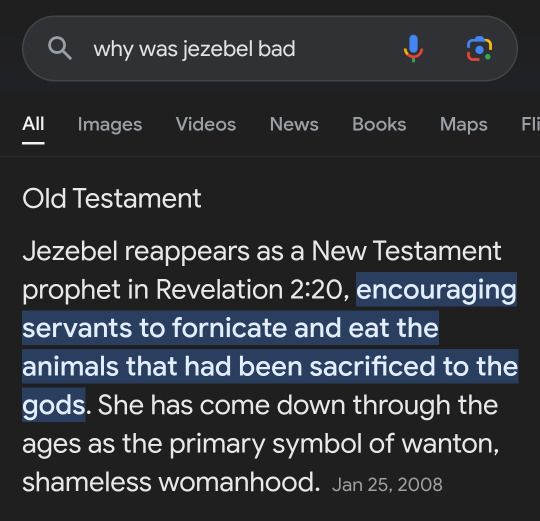
#just a reminder that jezebel is actually based#important note: the jezebel in revelation is probably just a symbol#or possibly a disguised reference to a real person who was alive at the time of the author#and is not a reference to the jezebel of the old testament#but the old testament jezebel is also based because she purged yahwists
3 notes
·
View notes
Text
Usually I would be clamouring for Alecto to be released by now but I need to go through atleast 3 separate revision cycles for the previous books before I can even *think* about Alecto
#will probably join a bible study group#to get all the biblical references#old testaments here i come#nona the ninth#alecto the ninth#the locked tomb
25 notes
·
View notes
Text
me, putting Bible quotes into a character's mouth: guess who's a Christian now >:3
#had her reference Jesus by name in 2020's unfinished whumptober and now she's quoting paul#funnily enough she's the miracle child of her 'verse. bet you've got some Thoughts and Feelings about that one sweetheart#writing is hard#my muse is a monster#personal#abbie needs a twitter#i forgot i also had her reference the old testament earlier in the story! that's right folks she's read the whole Bible
3 notes
·
View notes
Text
youtube
#koushirouizumi fotr#koushirouizumi posts#koushirouizumi ref#koushirouizumi no rb#koushirouizumi no rb posts#a: masachika ichimura#year: dec 14 2005#(Wow that's only *3 years* after 02 ended---!!1! And this was in t OKYO presented to the prESS)#(WOW YEAH I can hear some of these lyrics and also note how some of them changed)#(instead of the Tzar line etcetc...)#(You can hear a slight difference)#(They even kept the tallit!!!)#(Using 'Kami-sama' for Hashem *too* y u p...)#(Yeah a thing ppl dont seem to ~get~ is Hashem probably *would* be referred to such a way in a series production *too*)#(People see 'Kami-sama' and *automatically assume* 'Old Testament' and dont understand 'Old Testament' to us)#(IS THE 'Torah' except WE DONT CALL IT THAT AKA 'OLD' TESTAMENT!!! because we don't acknowledge any 'New Testament'!!!)#(Then they try to interpret such from a purely Xtian view and are SHOCKED when the 'theologies' don't line up 100 percent perfectly)#(Across Every Single Series Combined)#(Like...??? What did you EXPECT---)#(And then try to ~school us~ on how ~~we're interpreting the Old Testament {'''lore''' of '''the [~~'canon'~~] timeline'''} 'wrong'!!1!1!~~#(Like its one thing if people DONT do that and act respectfully discussing but hhhh th A T.....)#(sAVErS series aired *one year later* in 2006!!! LIKE)#(aNYWAY wHErES THE WHOLE THING IN JPN----)
0 notes
Note
Where can you find out when her songs are written?
extensive sleuthing
#taylorpictures.net and wayback machine to access old interviews#and youtube#and she’ll make a lot of offhand references to like#oh i wrote sad beautiful tragic on a bus#and then you go find an old tweet where she says she’s writing a song on a bus#and so you’re like okay sad beautiful tragic was written october 5 2011#and then just that for every single one of her songs#that same spreadsheet is basically a testament to like#everything taylor has said about her songs ever
0 notes
Quote
So also Abraham 'believed God, and it was credited to him as righteousness'.
Galatians 3:6 NIV (2011)
#bible verse#quotes of the old testament#faith#following God#righteousness#abraham son of terrah#references to the old testament
14 notes
·
View notes
Text
In a bold and controversial move that some are calling a violation of the first amendment, the United States is now limiting who is allowed to talk about Norse, Greek, and Egyptian mythology, as well as who is permitted to say the word “pagan” in reference to holidays and other festivals.
The department of justice has released a memo saying president Biden urged them to limit such conversations exclusively to people with degrees in related fields, but with the further stipulation that they must be able to correctly identify images of indigenous cultural practices when discussing Norse myth specifically.
When pressed for comment, president Biden said “man I gotta be real I’m sick to bastard death of that guy on TikTok and his theory that the Old Testament is written by a post-ragnarok Loki because he doesn’t understand Norse myth OR ancient Hebrew cultural matters. I’m also just so sick of people calling themselves pagan because the wear a mjolnir necklace or read the Aenead.”
693 notes
·
View notes
Text
Live Stream Sunday School - June 5, 2022
Live Stream Sunday School – June 5, 2022
https://www.facebook.com/gaines.melvin/videos/541597577607589
Sunday school session for Akron Alliance Fellowship Church, Akron OH.
Biblical Inerrancy – Session 18 – Canonicity (Part 2)

View On WordPress
#authentic#believer#biblical#biblical inerrancy#canon#church#consistent#dynamic#faith#God#inspire#Jesus#Josephus#Lord#Maccabees#New Testament#Old Testament#power#reference#tests#timeless#writings
0 notes
Note
do you still take requests? if you do can you write your take on this idea https://www.tumblr.com/ilydana/746501696852819968/cloneclonedbatman?source=share
Thanks for the Ask! That's is an interesting one!
Also as long as I can write something to it I don't mind getting requests, if I can't I will let people know if I can. So no worries about that K?
Out of courtesy and because I believe its is the right thing to do here the Link and a Tag to the original writer @ilydana I hope you don't mind that I am taking inspiration from you for this.
Also I don't know Conners Timeline well and I like to base my writings on the Wayne Family Adventures settings so.... yea sorry if I got some facts wrong....
-------------------------------
Clone double Wamy
Thinks were never easy for the Waynes, Bruce realised that when he sat in the meeting room. Usually he would have confronted his best friend in a more private setting, like when it was just the two of them or only Diana with them. But his best friend had been grating on his nerves with this for a while now. Bruce had honestly believed Clark had gotten better with the whole Clone thing but apparently he hadn't.
"All I am saying is that Conner is a person and to stop referring to him as 'it'." Bruce wasn't sure what had this brought on but maybe it was also having listened to his own kids rants about the way Conner had been and sometimes still was treated by Clark. Usually when someone called his friend out on it he would laugh awkwardly and say it was a slip of the tongue. That he still wasn't completely used to the idea of having a clone.
It's been years and Bruce wasn't buying that excuse anymore.
Well his persistent nagging had now caused this petty fight in front of everyone. He knew his children present, Dick and Tim, would have his back as well as most of their friends. But he also knew that those that prefer to keep the peace would try to argue in Clarks favor to sweep this hole problem under the rug once more.
"You don't get what it is like to be cloned or how long it takes to get used to it!"
His eye twitched under his cowl, he could also feel his kids tense up, especially Tim. His entire family had expirence when it came to cloning. The number of labs from the LoA they had shut down and destroyed was a testament to it. But there was one thing his entire Family aside from Alfred didn't know either.
"I actually do."
He stated calmly watching Clarks reaction as he stared unwaveringly at his best friend. He could see the colour drain, the paling and the pure look of disbelief he was getting, while Nightwing and Red Robin stood up to stand behind him with crossed arms. They probably thought he was referencing the time they had to fight Damian's Clones that sadly couldn't be saved like Conner had been.
"What do you....?" His best friend started but wasn't able to finish his question as Bruce decided to rip the bandaid off.
"The original Bruce Wayne died before he even was one month old. My parents, unable to cope with the loss cloned the baby with the help of a pair of scientist from Illinois." If the situation was different he might have laughed into the faces the people around him were making, not very Batman like of him but it was kind of funny. Still he was thankful for the comforting hand his son, Dick, placed on his shoulder or the way his other son, Tim inched closer protectively like. These two while probably shocked still stood by his side.
"And i was not the only clone that resulted from my parents original grief."
He left it at that as he stood and left the meeting without any further explanation. Bruce had made his point clear, now the ball was in his friends court. He was thankful that his kids followed him out as he went straight to the Zeta-Tubes to return to the Batcave. He knew his kids had questions for him, but he was not willing to answer them in front of the other heroes and thankfully his kids knew that that. So they silently followed him until they were back to the cave.
"B?" Dick asked tentatively once they were back in the came.
"It is as simply as I stated. My parents grieved the loss of their original son and unable to cope they cloned their own child with the help of a pair of scientist." He reiterated his earlier statement not looking at the two at first. For a brief moment he was thankful his other kids were out and about busy with other things.
"A pair of scientists?" Tim propped further and Bruce sighed wondering how much he should tell or if he could keep some things secret.
"Family actually. Estranged but they were... are family." He nodded. "The Fentons. Jack Fenton was my fathers cousin. Because of his field of research he got estranged from the family, not fitting into the perfect image my great grandparents had in mind for the Waynes originally. My father contacted him for help regarding the cloning back then."
"You said you weren't the only one?" He gave Tim a small smile, it was just like him to catch on to the small details and focus his questions on that.
"I didn't know until many years later when my parents died." He smiled a little remembering back to his training with Lady Gotham and how she asked him if he had siblings and then proceeded to introduce him to his clone twin. Ever since then Danny had become quite the fixture in his life, a reconnected family member. Though they had needed a lot of help when it came to actually speaking with each other but that thankfully Danny's sister Jazz helped.
He couldn't help the laugh that escaped him when he noticed Dick's stare of realisation. "Uncle Danny!"
Bruce just smirked, chuckling lightly as he gave his eldest a slight nod. "Danny."
Dick was the most familiar with Danny having meet the other a couple of times when he was younger and just started out as Robin. Bruce wasn't ashamed to say that Danny and Alfred had been the two he had asked for advice the most when he had taken Dick in back then. Danny had already expirence in raising kids from an even younger age than Bruce had. That their two cousins Dan and Danielle were in a way clones too was however something he would not be telling his kids yet. Frankly it wasn't his place and honestly if Danny hadn't become as comfortable as he had with this fact over the year he wouldn't have outed his clone twin to his kids either.
"So...." Tim started, rubbing the back of his head nervously. "...what now? Not that it will change anything now but uh...."
"Nothing really? I mean if Clark still got a problem then well I guess we don't have a super uncle anymore? But hey maybe we could introduce Uncle Danny to Conner?" Dick shrugged turning to Tim.
"But that would mean we admit to Uncle Danny that B let us in in the secret and that could make things awkward and..."
"Tim you are overthinking! It will be fine!"
Bruce smiled as he watched his two sons start to argue wether or not to introduce Danny to Conner. Well even if they did Danny wouldn't mind it. In fact Bruce had kept his clone twin updated on a lot of things that happened with his work as Batman. One of the reasons was that Danny had started out in the hero business way sooner than Bruce had but also because Danny was his last resort contingency plan against everything.
His twin would probably laugh in their faces and ask why it took them so long to introduce them and then drag his own daughter to meet Conner so they could have some 'clone'-bonding time and knowing Danielle, she was going to drag Dan along and then Bruce himself too. Bruce chuckled at that thought, he also knew that if Clark doesn't clean up his act than Danny would most likely swoop in and adopt Conner right out of under Clarks nose.
Well all he had to say if it came to that was that his best friend wouldn't be able to blame anyone but himself then.
#dp x dc#dpxdc#dcxdp#crossover#bruce wayne#danny fenton#tim drake#dick grayson#clone Bruce#clone Danny#Bruce and Danny are clone twins#Clark is kind of a jerk here#Danny is most likely adopting Conner the moment they meet#the batkids only knew Danny as uncle Danny before#they weren't aware he was a clone#they also don't have a problem with the clone thing#i don't care if it is ooc I just love a nice batfam dynamic#one where they wouldn't care that Bruce their dad was a clone#questions#answers#thanks for the ask!
329 notes
·
View notes
Text
In Judaism, one alternative way of referring to converts is "Jews by Choice."
If a parallel term exists in Xtianity I am not aware of it, but I would like to propose that it really should exist, albeit not just in reference to converts but to all Xtians. Every Xtian should get the opportunity to fully understand their faith in context and to make an informed decision to choose it for themselves. As it stands, many Xtians are deeply ignorant about Jewish history (before and after the formation of Xtianity), the original cultural context for the stories in the Old Testament, the cultural Jewish context that Jesus existed and taught in, the critical historical (scholarly) read of these texts, what they probably meant to the Israelites who produced them, and what they mean to Jews today and how we read these same texts differently in our religious context.
This creates a problem, where Xtians are taught only the narrow band of context that their church deems it important for them to know, and even that is frequently inaccurate or so limited in scope as to make it inaccurate by omission.
And this is because the reality is that the Tanakh (that is, the Hebrew and Aramaic scriptures that the Old Testament is based on) does not naturally or inevitably lead to the Jesus narrative. If you are starting from a Xtian perspective, and especially if you read the New Testament first and then and only then dive into the Old Testament, the Jesus narrative is obvious to you because you are looking for it, expect to see it there, and are coming at these texts with that reading lens in mind. And it's not that you or anyone else is nuts to see that narrative there - there are plenty of solid Xtian reads of these texts that make sense if you already believe in Jesus as presented by the New Testament.
But what the vast majority of Xtians aren't taught is how to approach the Tanakh from a Jesus-neutral perspective, which would yield very different results.
Now you might fairly ask, why would they *need* to approach the Tanakh with a Jesus-neutral perspective? They're Xtians! Xtians believe in Jesus, that's what makes them Xtians!
My answer is multi-pronged: First, I believe that G-d wants a relationship with all people, and speaks to us in the voice we are most likely to hear. That's inherently going to look different for everyone. And that's okay! G-d is infinite, and each of our relationships with G-d are going to only capture the tiniest glimpse into that infinite Divine. Therefore, second, when approaching religion, everyone sees what they want to see. If you nothing religion but find your spirituality in nature, you're going to come at these biblical texts with that lens and take away from them similar things that one might take away from other cultural mythologies. If you, like me, are coming at these texts with a Jewish mindset, you are going to come away with a portrait of Hashem and our covenantal relationship as Am Yisrael. And, of course, if you read with a Xtian lens, you're going to see the precursor narratives leading up to Jesus. That reading bias is not only understandable but good or at least deeply human. Everyone sees what they want to see in these texts. There is no objective or flawless way to read them, and to claim that there is, is to claim that not only is there only one answer, but only one kind of relationship that G-d wants to have with people, that you personally happen to know what that is, and that everyone else is wrong. I am sorry, but if you believe that - if you truly think that you in particular (and/or the people you happen to agree with) know the mind of G-d, then you do not worship G-d. You worship yourselves, because to know the entirety of G-d would require you to be G-d. There's a term for that. That doesn't mean there aren't wrong answers too. But it does mean that there is no singular unimpeachable reading of the texts. What you see in these texts then, says far more about you than it does about the texts themselves or G-d.
So the question then becomes: Why do you want to see this? (Whatever your "this" is.) If your read of these texts is something you choose, why do you choose to see what you see? And is it a meaningful choice if you are not taught other ways of knowing, other perspectives on these texts, and to think critically while exploring them?
Judaism inherently teaches a multiplicity of opinions on the texts, and maintains that they can be read to mean different things, even at the same time by the same person. Deep textual knowledge and methods for learning more, asking questions, challenging accepted answers as a way to discover new meaning, and respectful disagreement are baked into our culture and methods. Some Xtians of some denominations have analogous processes, although on the whole still emphasize correct unified belief over correct action with a multiplicity of belief. I am not suggesting here that Xtians stop approaching their own scriptures as Xtians or adopt Jewish methods instead. What I am suggesting is that Xtians should be taught a fuller picture of these texts and learn other perspectives so that they (1) understand their own beliefs and why they believe them (or after further inquiry if they believe them), and (2) understand and respect that this is what they are choosing to believe and that it is not the only thing one could reasonably believe. Because (3) if not, they are more susceptible to having their faith shattered at random by something unexpected, and will connect less to their faith as a relationship with G-d and more as an obligation based on an unchallenged world view.
And, frankly? (4) It will help them to be better neighbors, to love their neighbor as themselves, and to give to others the respect that they would like to receive.
Being taught the historical context, Jewish history before and after Jesus, the differences between the Old Testament and the Tanakh, the timeline of the development of Xtianity in relationship to rabbinic Judaism in the wake of the destruction of the Second Temple, the development of church doctrine and the various splits amongst the denominations, and Jewish readings of the Tanakh would give clarity and desperately needed context to Xtians about their religion. Is there some risk that some people, upon understanding these things would drop out of faith entirely or, like me, discover that they are actually meant to be Jews? Yes, definitely.
But let me let you in on a little secret: you don't want those people to begin with. You really don't. Because the reality is that if a person is not called to relate to G-d through Jesus, eventually that person will learn this about themselves one way or another. If they are given the information and tools to make a meaningful choice, they will part company on good terms. If not, they will likely become disillusioned and leave the church in pain, anger, and even trauma. They will bring that out into the world with them, and spread the bad news about the Good News making it even more likely that other people who were already on the fence will jump ship on bad terms. You cannot trick people into a meaningful relationship with G-d. You can only give them the tools they need in order to explore on their own and the rest is between them and G-d.
And the bottom line is that you don't need to and should not be afraid of knowledge. If your faith cannot stand up to scrutiny, then it deserves that scrutiny tenfold. The people you lose from the flock? You would have lost them anyway, because we aren't in the driver's seat here. G-d is. Hashem called me to be a Jew with just as much love and desire to connect as G-d calls Xtians to the church and to Jesus. A faith examined is a faith deepened or exposed in its weakness. And if it is the latter, don't you want people to know this sooner rather than later in order to fix it?
So my proposition and wish for Xtians is that they become Xtians by Choice. That they delve deeply into the origins and context of their faith so that they can be 100% certain that they understand their Xtian faith and why they choose to relate to G-d through that lens.
#every hour is theology hour around here apparently#interfaith#this is tochecha from an ex-Xtian ger#who desperately wants for my Xtian family friends and neighbors the level of peace and security in their faith that I now enjoy#the church is not doing its congregation any favors by under-educating them on these matters#Xtians deserve better and should demand better from the church#xtianity#anyway if I have any Xtian followers here who would like book suggestions lemme know
572 notes
·
View notes
Text
Trafalgar Law and Faith
Pre-emptive warning this is going to be another LONG metapost/analysis. There’s a lot I could talk about here but for the sake of structure I’m going to split this into three sections, i.e. the main ‘faith transitions’ that Law has gone through in the narrative thus far: 1. Flevance (catalyst for loss of religious faith), 2. Corasan (martyr that figuratively and literally saves law by giving him something to live for, introducing the will of D.), and 3. Luffy (cementing faith in this new belief system and regaining trust in the goodness of humanity through the living embodiment of everything Corasan believed in).
Before we get into all that though, let’s establish that Christianity is a thing in one piece. Speedrunning through some visual examples that come to mind; the Flevance church and nun (holding a celtic cross - censored in the anime version), a nun literally praying to God right before Marineford, Vinsmoke Sora’s grave marked with a cross (is op Christianity a northern thing?), Usopp and Chopper having crucifixes and holy water whenever ghostly stuff is brought up, Kuma and his trusty bible, the religious symbols on Kikoku’s hilt (could instead be more a reference to the Red Cross/symbol of humanitarian and medical aid as a doctor) and especially in whatever Mihawk’s got going on (though this could just be a Japanese cultural thing with Christianity being a minority religion or Oda just finding that some of the iconography, y’know. looks cool). There are also many other references to other religions e.g. hinduism, shintoism, buddhism, etc. Whether op forms of religion are the same as the real-world ones is debatable, and yes, Law being canonically raised as a devout catholic schoolboy with all the religious trauma associated with that is comical, but let’s take it all unironically for a hot minute. For fun.
1. Flevance
Law’s birthplace (Flevance) is described as being, at one point, “a very wealthy country with an unearthly beauty about it, with pure white soil and plants, like some kind of snow kingdom in a fairy tale.” The country’s wealth came from the very bedrock it sits on — white lead, which could be used to make various high quality products like tableware, cosmetics, weapons etc. When the wider world heard about this everyone wanted a piece of Flevance (the World Government also getting involved with distribution), and very quickly white lead became a “bottomless well of money”. So, hooray. Law gets to grow up in a rich city in a big house with educated doctor parents and probably gets to go to private school on weekdays and festivals with his family on weekends. One problem. In their greed, the Government and royalty have been knowingly hiding the truth about this supposed goldmine from the beginning. White lead is a toxic poison. Mining it from the ground over the last century and putting it in so many everyday products has resulted in it accumulating in the citizens’ bodies and leading to amber lead sickness, shortening their life-span with each successive generation – with the children of Law’s generation fated to die out before they reach adulthood.
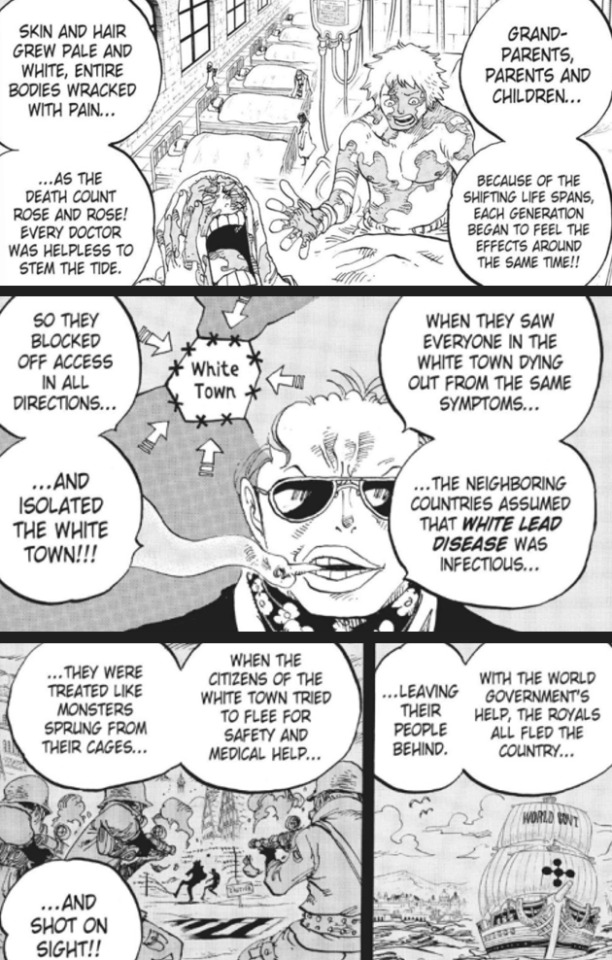
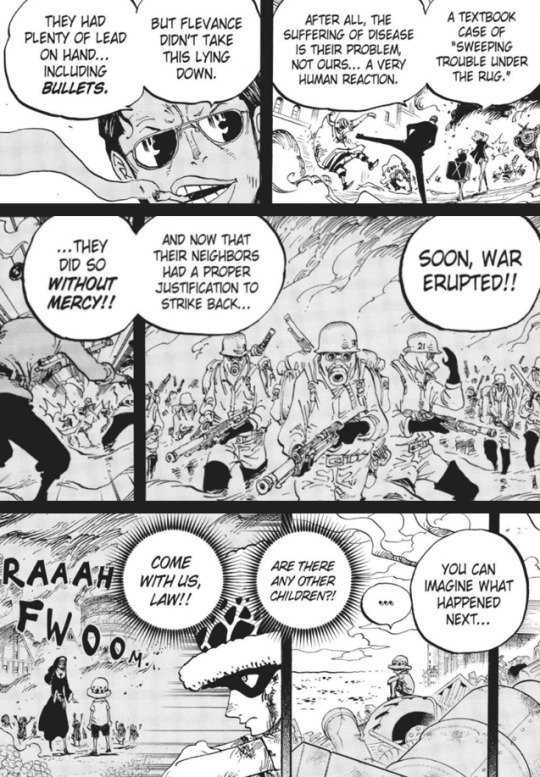
In the bible (especially in the old testament), God often inflicted these insanely disastrous events upon humanity, usually as some kind of punishment for their wrongdoings or as a test of their faith. Some events of which include (but are not limited to): famine, outbreaks of disease and natural disasters (e.g. hail, wildfire, earthquakes, floods). Historically, these stories played a key role in how humanity interpreted meaning from horrible disasters (e.g. assuming bubonic plague was sent as a punishment by god). Fire imagery is very common among these disasters as a representation for hell, which is clearly reflected in the destruction of Flevance.
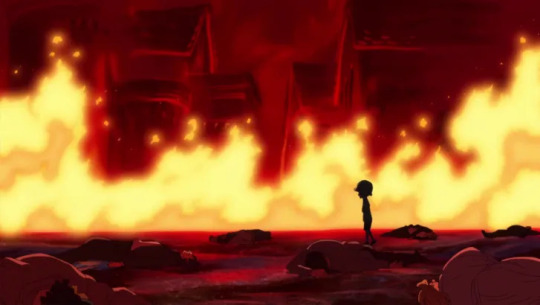

Sometimes these disasters had sole survivors act as messengers for God. With that context, let’s put ourselves back in the shoes of a ten-year old Law. Raised religious, freshly traumatised from losing his home, his devout family, all the comforts of his life, and having the outside world completely abandon him, this kind of event is likely going to be processed as some form of divine punishment. Law stumbles through hell, finds all his dead classmates, and the last words of sister nun echo through to him here. Merciful and salvation are huge catholic buzzwords – promises of holy compassion, deliverance and hope – and all of it fire and smoke and riddled with bullet holes before him. A genocide funded, perpetuated and covered up by the same body Law was promised was there to save them. And the only reason Law hadn’t died with them was because he wanted to stay with his little sister Lami, who was on her deathbed, and his parents, who were themselves trying to help the afflicted citizens, Law’s own father (before he was shot and killed alongside his mother) begging for more doctors, fresh blood, anything the world can offer, and asking “Why doesn’t the government announce to everyone that white lead is not infectious?”
Oftentimes (and in the case of Law), when there’s a promise of heavenly intervention or some miracle that doesn’t follow through, it results in an ultimate feeling of betrayal and anger. Unfortunately a lot of Catholic teachings also use a lot of guilt, essentially teaching people that the bad things that happen to you are your fault and there needs to be some sort of penance (queue Law’s survivor’s guilt that carries on down the road). But also, if this was supposed to be some divine punishment, for what exactly? For the town being blinded by the incredible wealth they were sitting on? Being lied to? Continuing to extract their livelihood, ignorant of its dangers? Punishment for who? His parents? His innocent little sister? For ten year-old Law? These people who believed in God, who were good people? That’s fucking stupid. None of these people suffered and died for any reason at all — certainly not for a sacred one. God hadn’t saved a single one of them. Law had to crawl out of hell himself by sneaking over the border under a mound of corpses.
Given everything that happened here, Law has every reason to fall into nihilism, and you can see how his upbringing would’ve bred a lot of the feelings of guilt, anger and resentment that you still see in Law (which would suggest that though this is where he likely cuts ties with the religious/Catholic component of his faith, growing up with these teachings in his formative years would definitely influence underlying beliefs about how the world works, and how Law behaves and subconsciously processes information), but at the same time, there’s usually some form of redemption and changes to how these patterns of behaviour can be approached later down the line.
2. Corasan
Fresh off witnessing his whole world burning down around him, Law meets Corazon at the very bottom of this pit of self-destructive rage and unprocessed grief. Rosinante himself mentions to Sengoku that the hatred in Law at this time reminded him of his brother, but beyond the anger, harsh pessimism, vengefulness, I think you have to reach to find similarities between them. You can see some fragments of Doffy in Law down the line at times, with Law seeming to enjoy violence (especially against the navy, but given what they did to Flevance, it’s some well-deserved retribution for Law imo), but I’m not so sure it’s the cruelty so much as it is the high he gets off his own flavour of justice. Doctor’s Hippocratic oath maybe, but never once does Law like seeing others die (even at this point, he’s in tears next to a dead body, even though he’s the one holding the knife), and later on in Wano he makes it explicitly clear to Zoro that he’d rather see the mission fail than have any of them end up dead.
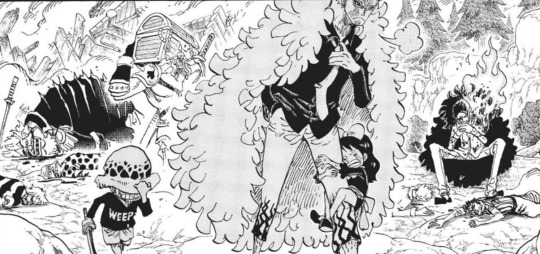
Little Law wanted to destroy the world and everything in it, but thinking rationally, what other choice did this kid have? He had no remaining family, was doomed to die before he hit puberty due to a terminal illness, was perceived as an infectious subhuman that most doctors would’ve sooner tried to exterminate than help. To Law, the world had turned its back on him – considering him a monster for simply surviving. He has all this hatred and pain boiling away with him with no tangible target to direct it towards. And this is the first clear cut rejection of faith that we see in Law. Any concept of a merciful God had just died. What God would allow this? Why is Law alive (a question that he repeats to himself throughout his life), why are these scumbags alive, why is the world going on spinning as if nothing has happened when his whole world had gone up in flames, why does anyone at all get to be here when everything I loved is gone? And it’s far easier to fall into a despondent nihilistic stupor than it is to work through any of that, and what’s the point in trying to process and move on from it, when there’s no hope for a future for Law anyway? When the only thing waiting ahead is more pain? What was this, if not a punishment? He’s supposed to be some messenger for God? How about fuck God, or whatever entity that exists that made him suffer this. Law’s not going to be a messenger for shit, thanks, he’d rather be their monster, he’d rather watch the world burn.
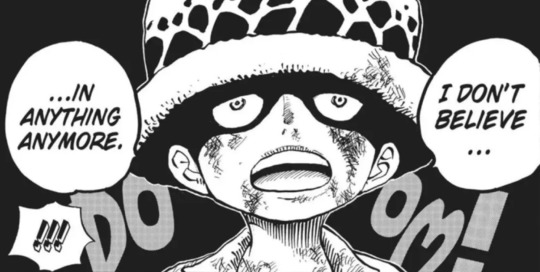
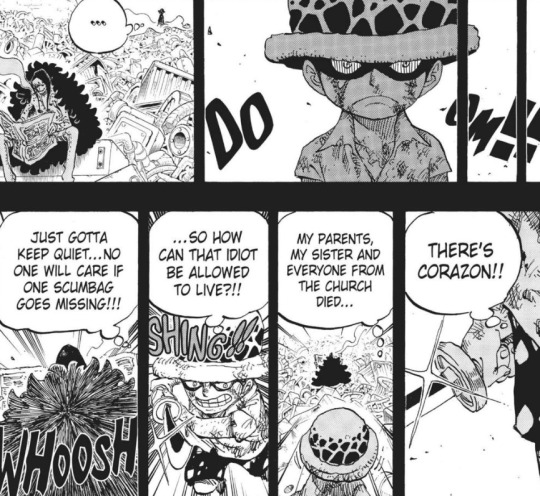
Corazon survives Law’s stabbing and doesn’t rat the little shit out (to Law’s confusion). It’s business as usual for another two years, then, one day Rosinante overhears his true name - Trafalgar “D” Water Law, and everything changes. On the back of his own beliefs, Rosinante dedicates himself to making sure Law a) lives and b) doesn’t become his brother. Law’s relatively short six month stint with Corasan forms the basis of Law’s new creed going forward, and all it took was a bit of kindness, love and humanity when the rest of the world had abandoned him. In the end Rosinante doesn’t save Law for the will of D. and the storm he’s predicted to bring in the future (as Law suspects), but he certainly believes in it, and the strength of Corasan’s conviction transfers right over to Law when he forces the ope ope fruit down the kid’s throat to heal him, tells Law he loves him, then sacrifices himself to set Law free.



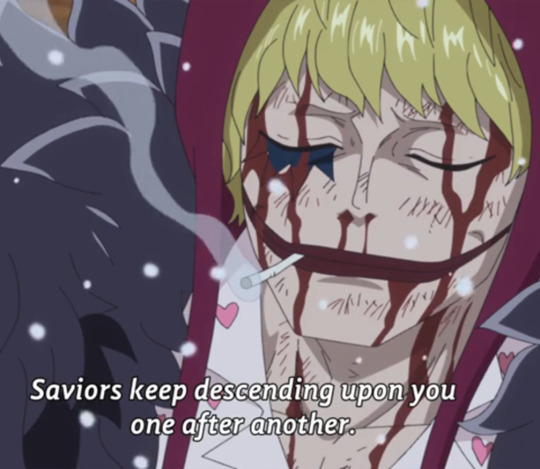
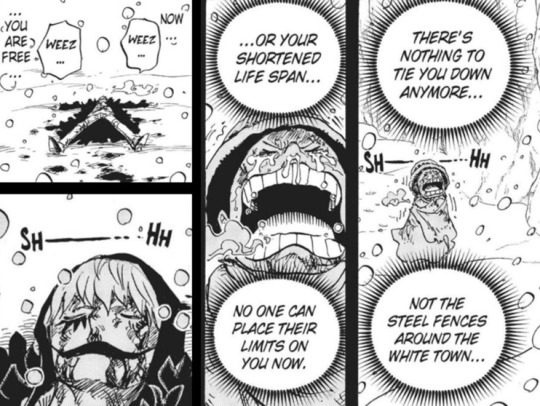
Law clings to that love he was given, he takes all these fundamental teachings and ways of thinking in regards to faith that were drilled into him during his youth, rejects the religion element and applies just about everything else to Corasan. He holds onto the last shreds of what Corasan leaves him with. Corasan becomes his “benefactor” (he gave my my heart), his saviour, his martyr.
And the crazy thing is, Rosinante was never really this saint Law makes him out to be. Law hated the clutz when they first met (mostly on account of Corazon throwing him through a glass window down at least two stories and into a pile of scrap). Corazon initially showed nothing but contempt for his presence (to ward him and the other children away from the Donquixote family, but these are still extreme measures). And it wasn’t until after learning Law’s name that Rosinante dragged him kicking, crying and screaming from hospital to burning hospital (not very saintlike in of itself), even after Law begged him to stop. Rosinante became Law’s saviour partly because of his belief in the will of D., and probably due to some guilt being a Donquixote, but mostly because he has always had a bleeding heart and he pitied (and had very quickly come to love) this angry, sick, deeply lost little kid. All this to say that Law’s faith in Corasan – this saintlike figure Law upholds him as in the future and the lengths he’s willing to go to avenge him/fulfil Rosinante’s purpose reflects the strength of the absolute beliefs Law would’ve been raised with in regards to God.
Whether it be out of survivor’s guilt (just one more body to heap on top of the Flevance pile), his love for Corasan, or for the sake of taking vengeance on the man that took away the one good thing he’d been able to regain in his miserable life, Law adopts Corasan’s will, the will of D. (which in of itself seems divine in nature), incorporates it into his new belief system, actively takes on the role of the divine punisher/justiciar and dedicates his life to bringing down Doflamingo.
3. Luffy
Catholicism dictates that the entirety of someone’s beliefs should be dedicated to one true cause (that cause being God) and expects people to ride on that, letting it carry them through life, give them hope, purpose, etc. But a lot of former Catholics choose instead to find that through something else. Corasan ignited the spark in Law’s faith around the will of D., but it’s not until he meets Luffy that this really becomes something that feels tangible and real for Law.
When Law saved Luffy in Marineford (putting the heart crew in danger for a stranger he met once), he said he did so “on a whim”, but that seems incredibly ooc for Law — this man that pretty much planned out how the rest of his life would go after the dust of Corasan’s death settled and he came to terms with the fact he wasn’t going to die at age thirteen like he’d originally thought. Circling back to the concept of Law being a sole survivor/messenger for God, it is interesting that Law is the one to seek out Luffy (given that Luffy is usually always the one either being abandoned by people or recruiting his crewmates), and Law is ultimately the catalyst for pulling him towards Dressrosa and Wano. There must be a REASON that led to Law deciding Luffy to be the most viable option out of the Worst Generation for an alliance (beyond blind trust in an unhinged captain that just so happens to also bear the initial D, and Luffy being one of the few captains crazy enough to go along with what Law was cooking up).
Law undoubtedly would’ve kept a peripheral eye on Luffy for some time before officially meeting him due to him being a rising competitor pirate and another “D” (I imagine the news of his utterly insane exploits would’ve made good reading material, too). The first time Law lays eyes on Luffy in Sabaody though, he still blows all expectations out of the water — crashing headfirst into the crowd of a slave auction and immediately committing a felony against a member of the most powerful upper one percent.
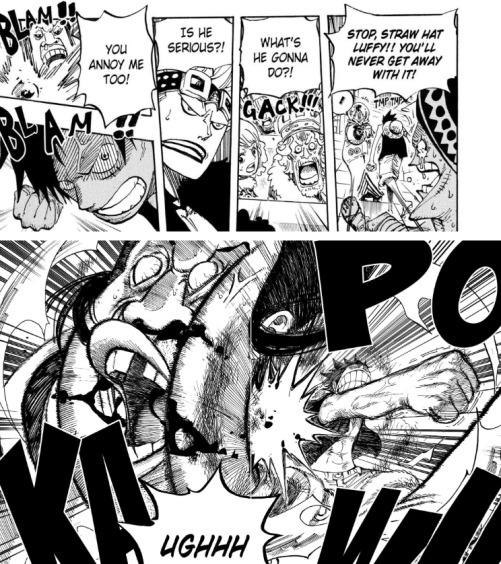

The world nobles are at an “untouchable God” tier in terms of class standing and believe it’s only natural for them to be entitled to whatever and whoever they want in this world that’s beneath them – the same kind of self-aggrandizing false divinity that Law has a a lot of repressed rage towards and that the will of D. is fated to oppose, so this, understandably, is a highly compelling first encounter, but it’s really only an initiating factor for what ultimately draws Law to Luffy. From their very first meeting (and probably before then, in the news stories and rumours Law likely picked up on), it’s made abundantly clear that Luffy does what he wants without a second’s hesitation, no matter the consequences, simply because he feels it is the right thing to do. Some call this an iron will, Law would be more inclined to call it willful stupidity and trouble, but time after time Luffy somehow manages to pull off what Law would best describe as “miracles”. And Law believes the straw hats just might be the ones to drum up another one for him.
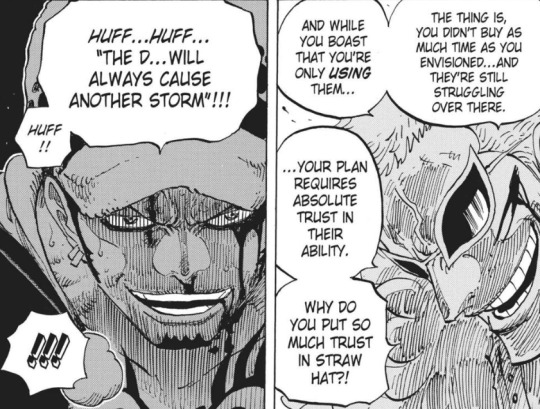
Luffy’s also got a lot of passing resemblances to Corasan going for him, e.g. inherently kind, compassionate liberators with big dumb hearts and wide goofy smiles in spite of everything they’ve been through, treating Law as nakama and saving his life despite his protests etc. All of which I’m sure Law hasn’t been completely unaffected by despite the high walls he puts up. And the more Law learned about Luffy the more it probably became clear that he is the antithesis to Doflamingo, i.e. what makes Luffy so goddamn dangerous and terrifying beyond his physical power is his ability to make friends with a simple kind of unconditional love that gets reciprocated enough so that these friends are willing to die for him.
Luffy agrees to the alliance, they successfully blow up Caesar’s base, and head off to Dressrosa. Now’s the time I should bring up that it’s taught in Catholicism that self sacrifice is the ultimate heavenly deed, and here Law is undoubtedly prepared to be a martyr for his cause. Law sends away his crew to Zou before Punk Hazard with the expectations that he’d never see them. He cultivates a fierce emotional detachment against Luffy’s willingness to bring him into the fold of the straw hats, and is resolute in that when the time comes, he will handle this himself, he will carry out Corasan’s will, and if he has to die for it, he will die with Corazon’s name plastered on his back. (Note here that Christianity is contradictory in that Law being this ready to die here is a sin, because revenge and suicide are highly discouraged, so you could say that by avenging and dying for his saviour, Law would be committing both the ultimate sacrifice and the ultimate sin).
Things get very dicey for Law in Dressrosa, to put it lightly. Doflamingo reveals that he was a celestial dragon (linking back into the will of D. “enemy of the Gods” notion), puts Law on the backfoot and gives him a thorough beating before shooting Law with a couple dozen white lead bullets in front of Luffy (because even when he’s winning Doffy loves to be a cunt about it). By the time Doflamingo is cuffing Law to the heart seat, it’s all looking pretty grim, and it’s very apparent when Luffy shows up to save him, that he is ready to die.

Law here has given up. He spent years planning his revenge for Corasan, but he lost, and he has very little left in the tank (physically, emotionally, spiritually). But Luffy doesn’t listen. Luffy who doesn’t think, doesn’t care, who trampled all over Law’s carefully laid out plan from the get-go and who is willing to take on Doflamingo single handedly for the simple slight that he dared to harm Luffy’s friend Law. Law will never find peace in his own demise because Luffy doesn’t do peaceful. He does loud and unashamed and open with no rhyme or reason other than the excruciatingly simply fact that he loves people and he thinks the people he loves deserve to have good lives. Luffy chucks Law over his shoulder and drags an injured Law across the city despite his protests (sound familiar?) and in the process inspires the fighting spirit in Law again.
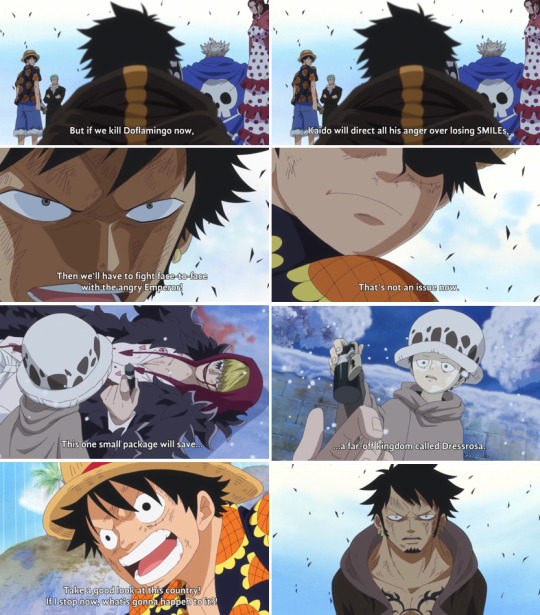
When Law confronts Doflamingo again with Luffy in tow, Law’s faith in Luffy confounds him. The last Doflamingo remembers of Law is this beautifully moldable dark pit of grief and rage who’d given up on believing, period – who wanted the world destroyed. Not so long ago, Law had been a candidate for Doflamingo’s next protégé. Now?
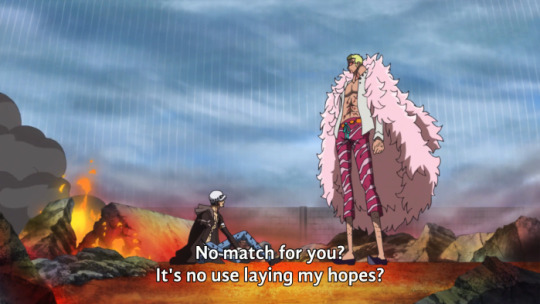
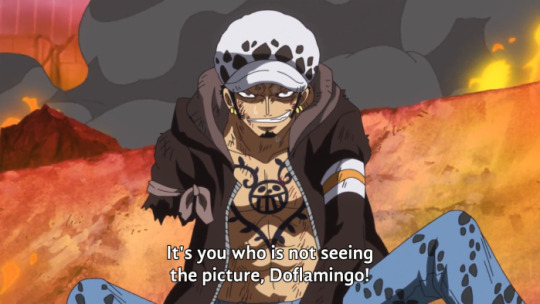

THIS is the action (grinning, staring down the barrel of a gun, flipping Doffy off as he tells him in not so many words that he may kill Law but he will never beat Luffy), Law’s unshakeable faith in the face of his own death is what has Doflamingo realising he will never regain control of Law again – is what incites Doflamingo to go from breaking Law down so he can build him back up again, to conceding defeat and outright killing him.
The trust that Luffy inspires in Law and the way he talks about Luffy (Luffy being this powerful, miracle-inducing liberator that Law can’t comprehend but follows anyway, Law laying down his hopes on him, weaponizing the will of D. to try and provoke fear from Doffy), is very reminiscent of the awe and faith talked about in scripture. Law discovers the feelings of comfort and hope that Catholicism was supposed to give him in Luffy, but Law’s belief in Luffy is a direct rejection of those teachings. Rejection by believing in a real life person as opposed to the divinity he was taught about. He’s also cementing his belief in the will of D., thus rejecting Doflamingo and all the people that embody the sort of “all powerful” divinity that he abhors (i.e. celestial dragons, Kaido, the Gorōsei/five elders) for the embodiment of hope and humanity.

When Law survives (again), he expresses he’d rather see Luffy beat Doflamingo with his own eyes or die with Luffy if he loses than leave. Then he watches, after all this talk of miracles, looking up in reverence as Luffy delivers, bright as the sun, haloed by the bars of a cage that’s haunted him for over a decade, Corasan’s words echoing at the back of his mind. God had never saved or freed Law, but Corasan was there for him, the heart crew was there, Luffy was there. And this is Law’s biggest, clearest rejection of religion – this newfound faith in humanity.
This faith in Luffy is put to the test again in Wano when Luffy is struck down by Kaido, but Law never truly stops believing that he’ll make a comeback. Even when the straw hats doubt whether he’s alive or not, something tells him Luffy’s not dead, and he holds onto that hope.
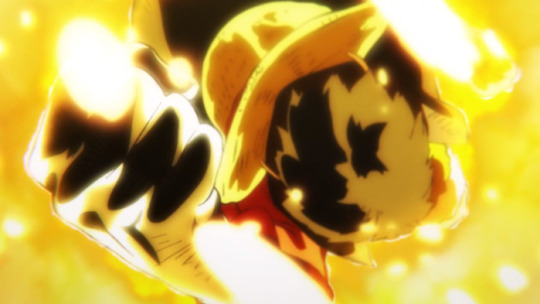


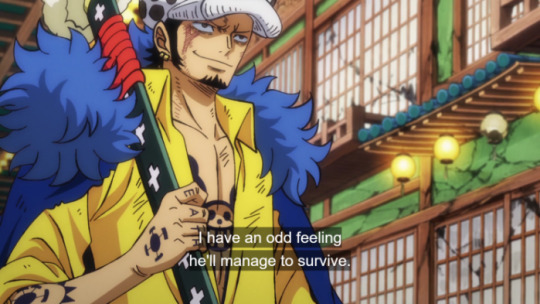
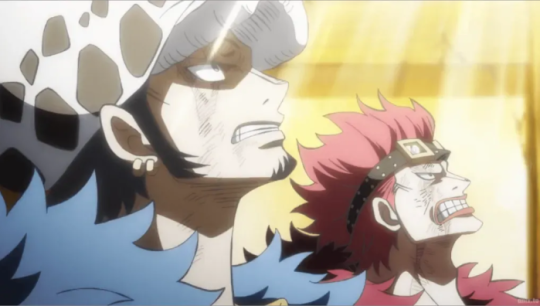
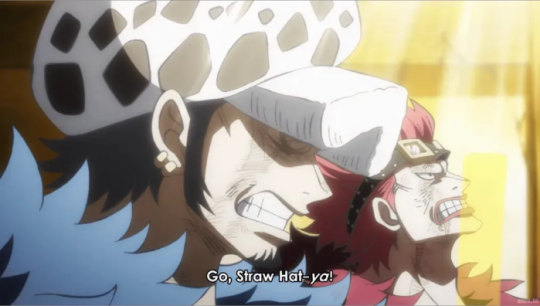
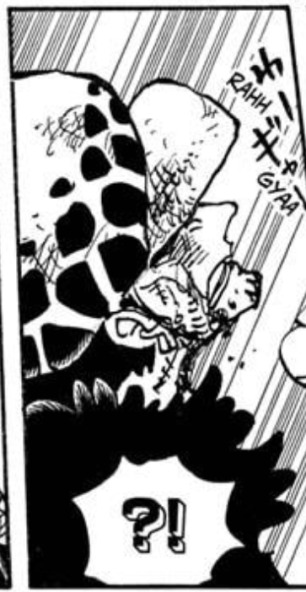

We also have the whole nika/joyboy backstory which really only reinforces all of this imagery/god-fearing looks of awe from Law and this idea of Luffy who is this perfect juxtaposition of empathetic and kind to incredibly fearsome fire and brimstone fighter. And regardless of whether you’re into the ship or not this is the impetus of Law’s relationship with Luffy for me, because here’s Luffy who has every right to have a chip on his shoulder and be downtrodden about all the injustices against him, here’s this little guy who against all odds, in the darkest of places, embodies light and hope and kindness and proves to Law that there will be hard times but there IS a happy ending at the end of the tunnel, despite it all. And everytime Luffy rises to the insurmountable challenge and wins, it just further cements that the will of D. is alive, that Corasan was right, that there's something redeemable in Law, a reason why he was worth saving, even if Law doesn’t understand it quite yet.
#merry christmas law religious trauma be upon ye#what’s an endearing idiot to a non-believer#long post#favourite character thesis statement. or something#ive been wanting to talk about this for a while but just been gathering my thoughts#will preface all this by saying I was not born or raised religious but the concept’s all very compelling from an outsider’s perspective#but I have had conversations about this to people like lesbianluffy who *were* raised catholic and relate to this experience#who I have to thank a lot for helping me wrap my head around this#this is a compilation of thoughts and conversations over the last two or so months#one piece#op#CJ's op watch-through#trafalgar law#monkey d. luffy#donquixote rosinante#donquixote corazon#monkey d luffy#lawlu#trafalgar d water law#gear 5 luffy#sun god nika#wano spoilers#lulaw#op meta#op analysis#one piece analysis
362 notes
·
View notes